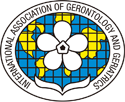NEAR’s first symposium at the IAGG-ER!
2018-11-26
We hope to see you there!
SYMPOSIUM PROGRAM
NEAR – the National Infrastructure on Aging Research in Sweden: building on 30 years of experience to prepare for future aging research
Chair: Laura Fratiglioni, Karolinska Institutet and Stockholm University, Co-chair: Debora Rizzuto, Karolinska Institutet and Stockholm University.
- Gene-Environmental Interplay to Explain Health Heterogeneity: Results from Swedish Twin Register. Speaker: Nancy Pedersen, Karolinska Institutet
- Social Inequalities in Health in old age. Speaker: Johan Fritzell, Karolinska Institutet and Stockholm University.
- Redefine dementia diagnosis etiology in epidemiological studies. Speaker: Ingmar Skoog, University of Gothenburg.
- Care of elderly people. Speaker: Anders Wimo, Karolinska Institutet.
- Neuroimaging Biomarkers in Brain Ageing. Speaker: Lars Nyberg, Umeå University.
Abstract
Since the 1970s, Swedish longitudinal population-based studies have played a major role in geriatric research by exploring health-related conditions in older adults. Most of those studies are now collaborating to build the newly started National E-infrastructure for Aging Research (NEAR) to empower aging research in Sweden. This symposium presents and discusses some of the breakthrough contributions of the participating studies. The Gothenburg Population Studies will provide a comprehensive overview of the role vascular factors play in dementia and Alzheimer disease, starting with pioneering evidence of the impact of high blood pressure on dementia risk. Findings from the Swedish Twin Registry, which uses a life course approach, will also be presented. This research has quantified genetic and environmental influences on common chronic disorders and individual changes in physical and cognitive functioning. SWEOLD will present results on the relevance of living conditions and family connections to well-being and healthy aging, as well as information on health inequality by sex, education, and socioeconomic position found in older adults, even in Sweden. Speakers will also cover findings on the complexity and heterogeneity of older adults’ health in relation to care needs and use of medical and social resources, based on integrated information from the four SNAC studies. For a more complete picture, temporal trends of different health indicators will also be presented. Finally, findings from the Betula project will be presented; researchers have observed large heterogeneity in memory-aging profiles linked not only to genetic and lifestyle-related factors but also to specific brain characteristics that could be used as clinically relevant biomarkers. In conclusion, NEAR integrates rich medical and social data and brings together the scientific experience of its founders, providing unique opportunities to identify sustainable intervention strategies for better health and care for old people.











